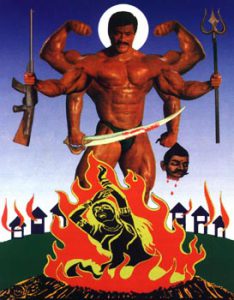Time In: Television, films, internet
Father, Son and Holy War
Nandini Ramnath, Time Out Mumhai

Coming up on television on October 8: the MTV music awards, a film starring Robert De Niro and Brad Pitt, another starring Govinda, and a documentary about the link between men with ants in their pants and fire in their bellies.
After attempting to block the screening of Anand Patwardhan’s red-hot 1994 documentary Faster, Son and Holy War for over a decade, Doordarshan has had to cave in and slot the film’s Hindi version on Sunday, October 8. The two-hour documentary is divided into two segments and looks at the connections between anxiety over masculinity and the rise of religious violence. Patwardhan had challenged the public broadcaster’s refusal to air the documentary on law and order grounds and waged an 11 -year war in the Bombay High Court and the Supreme Court. On August 25, a Supreme Court bench ruled that “in our view it would not be proper to deny telecast of an award-winning documentary merely on the ground that part II of it is certified as ‘A’ by the Censor Board”.
Although a time slot hadn’t been fixed at the time of going to press, a Doordarshan official assured Time Out that the air date wouldn’t be moved. “The documentary is being aired as a special show,” said the official, who asked to remain unidentified. “This is as per the Supreme Court order and once there is a court’s direction, we have to comply with it, and we’re going to comply with it.” Unconfirmed reports suggested that Doordarshan will also air Patwardhan’s latest documentary, War and Peace, on October 15.
The saga of Patwardhan vs Doordarshan began with Bombay, Our City, his 1985 film that was aired on the channel only after a Supreme Court directive in 1989. Similar successful litigation followed for In Memory of Friends, on communalism in Punjab, and Ram Ke Naam, about the rise of Hindutva. Patwardhan argued that a public broadcaster couldn’t refuse to screen documentaries on issues of importance. “I can’t go to private channels and force them to show my films,” Patwardhan said. “But DD isn’t supposed to be run on commercial lines. It’s supposed to have the public interest at heart.” Patwardhan’s victory throws into focus the uneasy relationship between the message of documentary and the medium of television. When it comes to broadcasting documentaries, the balance is unfairly tilted in favour of cuddly animals and Rajasthani forts. Dinnertime-unfriendly documentaries on such irritants as female infanticide and caste wars have rarely been given space across channels, private or government-funded.
There’s a reason for the aversion to documentaries: in the pre-satellite era years, Doordarshan screened preachy nation-building audio-visual lectures that put many viewers off the form altogether. Hope appeared in 1995 in the form of the private channel TVI, promoted by the Business India Television group. For the four-odd years that the channel was on air, it beamed several documentaries by independent filmmakers. Mismanagement weighed TVi under, and since then, no channel, including the self-righteous NDTV, has touched independent documentaries. Besides, when there’s reality television to sit down to, why should anyone care about documentaries?
Ironically, it’s the much-maligned Doordarshan that has kept the documentary flag flying, even if it isn’t exactly flying atop the mast. The goverment-supported Public Service Broadcasting Trust funds 28-minute documentaries that are aired on DD-l at 10.30pm every Saturday. There are complaints: the duration is too short; the funds – between Rs 3 lakh and Rs 3.5 lakh per film – are not always adequate. In addition, the nagging feeling that nobody watches Doordarshan any more is hard to fight.
The broadcast of Samina Mishra’s PSBT-funded/fowse on Gulmohar Avenue on July 30 had varied responses. “The most valuable screening experiences have been the ones with young people where I have been present,” the Noida-based filmmaker said. “I know how audiences are reacting. TV is more anonymous in that sense. However, given that DD is state-funded, and if we think art is a public thing, all of us need to do our bit to create space for it. As a bureaucrat if you can create space for it, you should.” Mishra said “strange persons” have told her they saw her film on Doordarshan. “Obviously it does go out there. It’s a question of being advertised and pushed.”